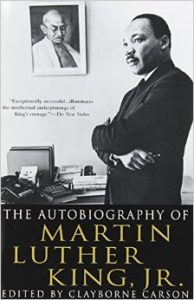I was only ten years old when Martin Luther King was assassinated. As a child of the south I lived through the integration of public schools and heard the racist dialogue of adults all around me. When Martin Luther King, Jr. was killed no one in my circle mourned.
Even as a child I never understood racism. The integration of the schools did not cause me any harm. However, Dr. King was little more than distant image to my young imagination. Later, in high school I read Dr. King’s speech – “I Have a Dream” – and was captivated by its message. As a student of Holy Scripture and American history, I began to learn of the racist history of our nation. A PBS documentary – Eyes on the Prize – was very helpful and to my mind should be required viewing for all young Americans. As a young pastor I read Dr. King’s “Letter from a Birmingham Jail.” While I don’t believe Martin Luther King, Jr. to be a saint, I do believe he was a prophet filled with the Spirit and courage.

Several years ago I read Clayborne Carson’s book – The Autobiography of Martin Luther King, Jr. It’s not an autobiography in the strict sense, because Dr. King didn’t write it. But Mr. Carson wrote this book in the style of an autobiography using King’s journals, speeches, and other sources. It’s a compelling read filled with fear, tension, and a hopeful cry for justice. I learned that before his death, King was not universally admired by the black community. Many younger activists rejected King’s call to non-violence, and were slowly coming to reject his leadership.
King’s call to non-violent social transformation was strongly informed by his Christian faith – the words of Jesus in the Sermon on the Mount. When most white southern pastors were silent, or promoting a so-called Biblical view of “separate but equal,” King’s prophetic words challenged them to Biblical justice. Many white southerners eventually repented of their racist sins, including George Wallace and Jerry Falwell.
A few years ago I was honored to stand behind the pulpit at Mason Temple Church of God in Christ where Dr. King delivered his last message. I was reminded that he was not just a great civil rights leader, but he was one of the most effective preachers of the twentieth century. His sermons echo from the grave, his words still move multitudes, his message still convicts sinners.
What I most admire about King was his sight – his vision of justice and righteousness. Like all true prophets, he could see what most could not. He knew that every southern white person was not a racist and he appealed to the better angels of our nation. He challenged his followers to answer hate with love. As he prophetically peered into the future of the United States he envisioned a day when “little black boys and black girls will be able to join hands with little white boys and white girls as sisters and brothers.” In other words, like all true prophets, King could see beyond the prejudice and injustice of his own generation. He hoped for a better world for his grandchildren. He could see something that can be accomplished only by men and women filled with the Spirit of God living in the excellence of love.
I pray that God will heal the blindness of our eyes so that we may see as clearly as Martin Luther King, Jr.
